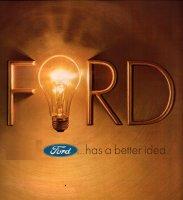
My family and I have been driving Ford vehicles for a number of years and like them very much. I have always wondered why their sales are not better since they suit our family needs very well. Accordingly, when I read the newsletter of Dennis DesRosiers talking about his time at the Auto Show, "Three Days In Detroit," I found his comments about Ford most interesting and most disturbing. Check them out for yourself
Ford Still Struggling for Direction
Talk is cheap, actions speak louder than words, and so on and so forth. I heard the word "innovation" drop from the mouths of Ford executives too many times to count. "Innovation" in the present, "innovation" in the future, "innovation" plastered on all the press kits and printed materials. "Innovation" printed in foot-high letters from floor to ceiling on the gateway to Ford's display area. If there really was a significant amount of for-real innovation in the products, it would be allowed to speak for itself.
Ford never escaped the 'black cloud' of their impending plant closing announcements on January 23rd. Most media reps wanted to ask questions about which plants would be closed rather than the new products spinning on the turntables. Of course, whatever good intentions went into the creation of Lincoln's two vehicles didn't translate into excitement, and quite likely will not translate into sales. The MKX crossover (Ford Edge with a grill job) and MKS sedan (Five Hundred in a tux) move the brand even closer to Ford/Mercury than before. In her speech introducing the new vehicles, Lincoln COO Anne Stevens said that Lincoln does not intend to compete internationally: (paraphrased) "The real competition is here in the United States." Well, I'm sorry: If you can't compete globally then you can't compete in the U.S.
Do you think anyone at Honda has ever dared voice a similar opinion? Toyota? BMW? Insularity is never a strong strategy. Design for the best and consumers will notice the difference.
Stevens went on to say that Lincoln was aimed at people who work hard, love America, and, uh, work really hard! Apparently, it's not politically correct to say "successful blue collar." The irony is that Lincoln has likely produced a worthy vehicle, but their marketing machine refuses to recognize it as such.
There's a perceived credibility gap around Ford. Sitting at a Ford press briefing, murmurs, grins, and swivelled heads abound when the talk turns to hybrids, market share, or "competitiveness." These same jaded journalists become earnest when seated at a Honda or Toyota event. You can see the wheels turning in their heads: "Yes, I believe them when they say that they'll do this. They've stayed true to their word in the past." The same cannot be said for Ford, an entity that has consistently promised high and delivered low.
Ford never escaped the 'black cloud' of their impending plant closing announcements on January 23rd. Most media reps wanted to ask questions about which plants would be closed rather than the new products spinning on the turntables. Of course, whatever good intentions went into the creation of Lincoln's two vehicles didn't translate into excitement, and quite likely will not translate into sales. The MKX crossover (Ford Edge with a grill job) and MKS sedan (Five Hundred in a tux) move the brand even closer to Ford/Mercury than before. In her speech introducing the new vehicles, Lincoln COO Anne Stevens said that Lincoln does not intend to compete internationally: (paraphrased) "The real competition is here in the United States." Well, I'm sorry: If you can't compete globally then you can't compete in the U.S.
Do you think anyone at Honda has ever dared voice a similar opinion? Toyota? BMW? Insularity is never a strong strategy. Design for the best and consumers will notice the difference.
Stevens went on to say that Lincoln was aimed at people who work hard, love America, and, uh, work really hard! Apparently, it's not politically correct to say "successful blue collar." The irony is that Lincoln has likely produced a worthy vehicle, but their marketing machine refuses to recognize it as such.
There's a perceived credibility gap around Ford. Sitting at a Ford press briefing, murmurs, grins, and swivelled heads abound when the talk turns to hybrids, market share, or "competitiveness." These same jaded journalists become earnest when seated at a Honda or Toyota event. You can see the wheels turning in their heads: "Yes, I believe them when they say that they'll do this. They've stayed true to their word in the past." The same cannot be said for Ford, an entity that has consistently promised high and delivered low.

No comments:
Post a Comment